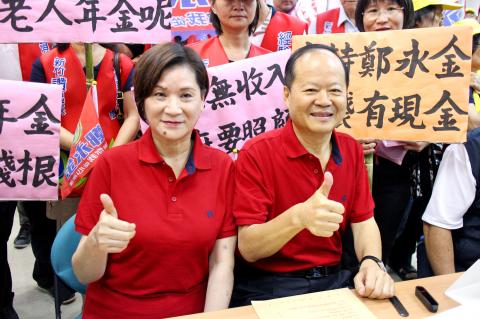The Democratic Progressive Party (DPP) has drawn criticism over its decision to not nominate a candidate for Hsinchu County commissioner, choosing instead to support a former commissioner who was expelled from the Chinese Nationalist Party (KMT) for running without the party’s nomination.
“In order to win the election, the DPP has chosen to work with a local political faction,” Liao Pen-chuan (廖本全), an associate professor at National Taipei University’s Department of Real Estate and Built Environment, said yesterday.
“However, local factions are only concerned about their own interests — how to maximize their interests, divide the [spoils] and further expand their political influence — and do not care about democracy or rule of law,” he said.

Photo: Huang Mei-chu, Taipei Times
“Therefore, this kind of collaboration is only about winning the election and interests; it would not bring anything fruitful for our democracy — just rot,” the long-time activist said.
Liao was referring to a decision by the DPP’s Central Standing Committee on Wednesday to not nominate a candidate for the Hsinchu County commissioner election on Nov. 29. Instead, it has chosen to collaborate with former Hsinchu County commissioner Cheng Yung-chin (鄭永金), who was expelled from the KMT because he insisted on running despite the party nominating the incumbent commissioner, Chiu Ching-chun (邱鏡淳), for re-election.
Former DPP Hsinchu County commissioner Lin Kuang-hua (林光華), who was defeated by Cheng in his 2001 re-election bid, and again lost to Cheng in 2005, has also agreed to help Cheng in his bid, while Cheng promised to campaign for DPP candidates for the county council.
A voter in Jhubei City (竹北), Hsinchu County, surnamed Huang (黃), also criticized the DPP’s decision.
“The DPP was very critical of the KMT in Hsinchu County, especially when Cheng was the commissioner, so I don’t understand the logic behind its collaboration with the KMT now,” Huang said. “But I’m not surprised at all, this is how politicians and political parties are.”

Taiwan is stepping up plans to create self-sufficient supply chains for combat drones and increase foreign orders from the US to counter China’s numerical superiority, a defense official said on Saturday. Commenting on condition of anonymity, the official said the nation’s armed forces are in agreement with US Admiral Samuel Paparo’s assessment that Taiwan’s military must be prepared to turn the nation’s waters into a “hellscape” for the Chinese People’s Liberation Army (PLA). Paparo, the commander of the US Indo-Pacific Command, reiterated the concept during a Congressional hearing in Washington on Wednesday. He first coined the term in a security conference last

Prosecutors today declined to say who was questioned regarding alleged forgery on petitions to recall Democratic Progressive Party (DPP) legislators, after Chinese-language media earlier reported that members of the Chinese Nationalist Party (KMT) Youth League were brought in for questioning. The Ministry of Justice Investigation Bureau confirmed that two people had been questioned, but did not disclose any further information about the ongoing investigation. KMT Youth League members Lee Hsiao-liang (李孝亮) and Liu Szu-yin (劉思吟) — who are leading the effort to recall DPP caucus chief executive Rosalia Wu (吳思瑤) and Legislator Wu Pei-yi (吳沛憶) — both posted on Facebook saying: “I

Sung Chien-liang (宋建樑), who led efforts to recall Democratic Progressive Party (DPP) Legislator Lee Kun-cheng (李坤城), was released on bail of NT$80,000 today amid outcry over his decision to wear a Nazi armband to questioning the night before. Sung arrived at the New Taipei District Prosecutors’ Office for questioning in a recall petition forgery case last night wearing a red armband bearing a swastika, carrying a copy of Adolf Hitler’s Mein Kampf and giving a Nazi salute. Sung left the building at 1:15am without the armband and covering the book with his coat. Lee said today that this is a serious

Firefighters are working to put out a fire on Taipei’s Yangmingshan (陽明山) reported earlier this morning. The cause of the fire is still under investigation. The Taipei Fire Department said it received a report of a fire at Xiaoyoukeng (小油坑) at 11:17am, dispatching four command vehicles, 16 firetrucks, one ambulance and 72 personnel. The fire is still burning on about 250m² of land, according to initial estimates, as eyewitnesses reported seeing smoke rising from the mountain. The Yangmingshan National Park Headquarters on Facebook said the Qixingshan (七星山) hiking trail starting from Xiaoyoukeng and the Xiaoyoukeng parking lot are closed as firefighters work to put